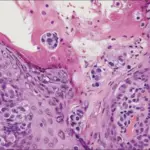Invasive papillary carcinoma is a rare type of invasive ductal carcinoma.
What is the Pathology of Invasive Papillary Carcinoma?
The pathology of with invasive papillary carcinoma is:
-Etiology: The cause of with invasive papillary carcinoma may be due to radiation exposure.
-Genes involved: MMPs, NGF/NTRK1
-Pathogenesis: The sequence of events that lead to invasive papillary carcinoma are thought to be due to major chromosomal changes: 16p gain, 16q loss, 1q gain and 7q loss.
-Morphology: The morphology associated with with invasive papillary carcinoma shows the solitary mass, solid and cystic, round, oval, lobulated, or irregular.
-Histology: The histology associated with invasive papillary carcinoma shows invasive carcinoma with papillary architecture and an invasive growth pattern without a surrounding fibrous capsule. The growth pattern is arborizing fibrovascular stalks lined by epithelial cells.
How does Invasive Papillary Carcinoma Present?
Patients with invasive papillary carcinoma typically are female present at age range of sixth to eighth decade that present with breast concerns.
How is Invasive Papillary Carcinoma Diagnosed?
Invasive carcinoma is diagnosed through mammogram, breast ultrasound (US), and breast MRI, and biopsy.
How is Invasive Papillary Carcinoma Treated?
Invasive carcinoma is treated by surgical excision followed by adjuvant radiation and systemic therapy based on the predictive and prognostic factors.
What is the Prognosis of Invasive Papillary Carcinoma?
The prognosis of invasive papillary carcinoma is good when compared with invasive ductal carcinoma. Poor prognostic factors include old age, advanced pathologic stage, and patients without radiation.



